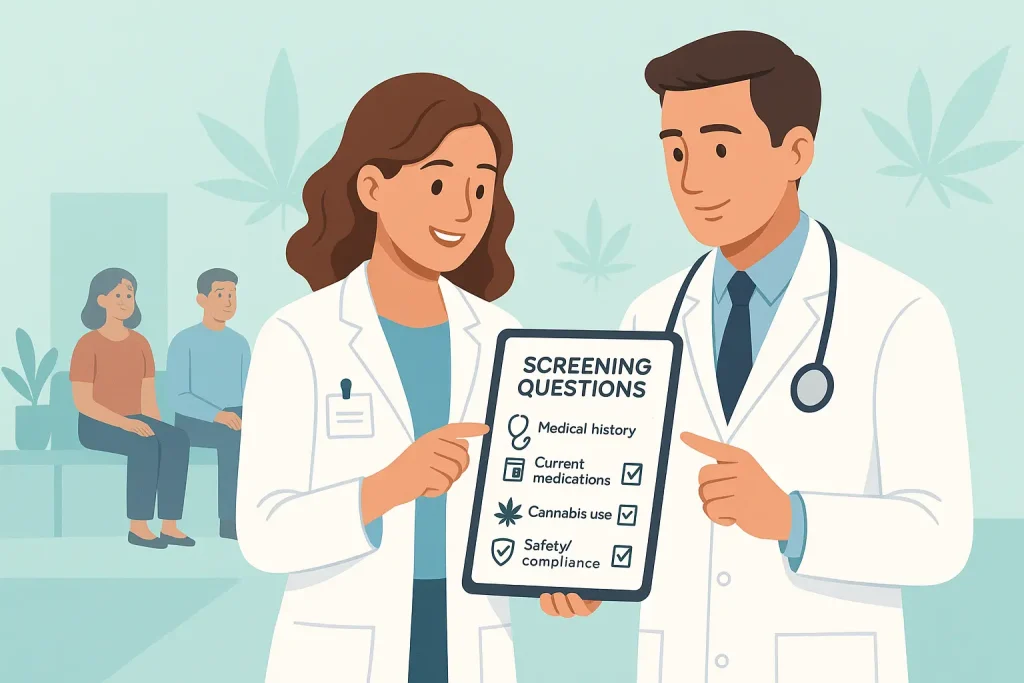
Let’s be honest, keeping up with medicinal cannabis regulations in Australia can feel like a full-time job. Just when you think you’ve got your head around TGA requirements, something changes. And don’t even get us started on trying to balance compliance with actually caring for your patients.
Here’s the thing, though: it doesn’t have to be this complicated. At Cannabiz Elite, we’ve taken all those dense regulatory documents (yes, including the TGA’s Guidance for the use of medicinal cannabis in Australia) and turned them into simple, effective screening questions that actually make sense. Your patients get a smooth experience, and you get the peace of mind knowing you’re ticking all the right boxes for SAS-B and Authorised Prescriber pathways.
What makes us different from other cannabis software companies?
We actually remember there’s a real person on the other side of that screen. While others pile on endless compliance checkboxes, we’ve designed our affordable screening tools around the patient journey. Because let’s face it, if your patients can’t complete the screening, compliance doesn’t matter anyway.
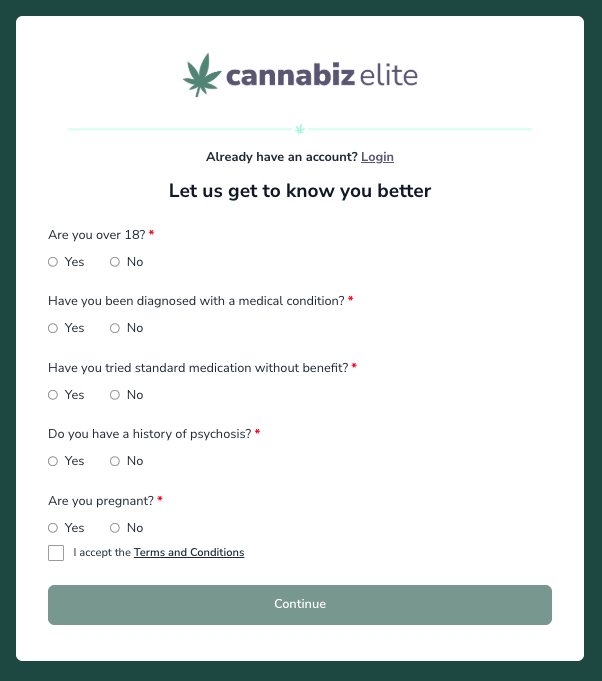
Age Verification Meeting Legal Requirements
This one’s pretty straightforward, but it’s amazing how many clinics still do this manually. In Australia, patients need to be 18 or older to access medicinal cannabis without jumping through extra hoops. According to the AHPRA’s Good Medical Practice guidelines, for anyone younger, you’re looking at specialist involvement and additional requirements.
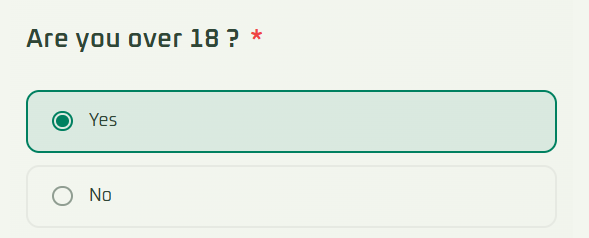
Our system handles this automatically. Patient enters their details, system checks their age, done. If someone under 18 tries to proceed, it doesn’t just block them; it explains what needs to happen next and can even guide them toward appropriate pediatric pathways if you offer them. No awkward conversations, no manual calculations, no accidentally processing an underage application at 4:30 on a Friday afternoon when everyone’s tired.
The best part? Everything’s documented. So when audit time rolls around (and it always does), you’ve got a clear record showing you checked every single patient’s age properly. It’s one less thing to worry about. [View our age verification demo]
Confirming a Diagnosed Medical Condition
Here’s where things get interesting. The TGA wants to know that patients have actually been diagnosed with conditions before they access medicinal cannabis. Fair enough. But have you ever tried explaining Question 7 on the SAS-B form to a patient? It’s not exactly bedtime reading.
We’ve translated all that regulatory language into questions real people can actually answer. Instead of asking patients to “provide clinical justification for treatment,” we ask things like “What condition has your doctor diagnosed you with?” and “How does this affect your daily life?” Simple, right? But it captures everything the TGA needs to see.
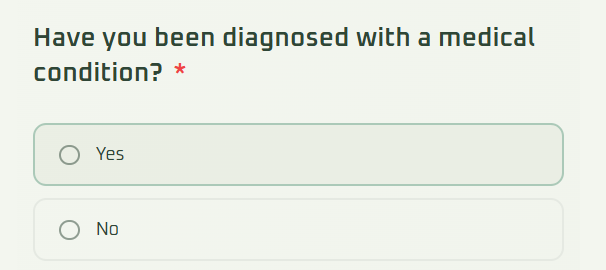
Our screening covers all the usual suspects: chronic pain, epilepsy, cancer treatment side effects, anxiety, PTSD, and more. But here’s the clever bit: it adapts based on what patients tell us. Someone with chronic pain gets different follow-up questions than someone dealing with chemotherapy side effects. This way, you’re not making a cancer patient wade through irrelevant questions about back pain. It’s just common sense, really.
Checking Previous Treatment History
You know the drill: the TGA generally wants to see that patients have tried conventional treatments first. But getting this information from patients can be like pulling teeth. “What medications have you tried?” often gets you blank stares or novels, with nothing in between.
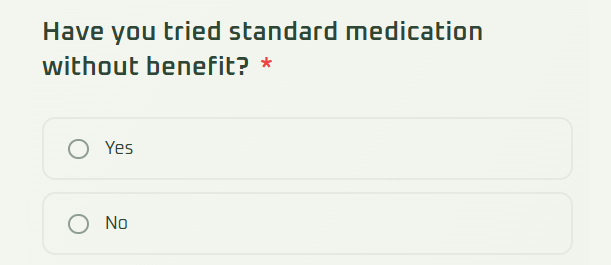
Our screening breaks this down into bite-sized pieces. We ask about specific medication types, how long they tried them, and why they stopped. The questions make sense to patients because they’re based on real treatment journeys, not regulatory checkboxes. And yes, it all aligns perfectly with AHPRA’s requirements for thorough clinical assessment of Good Medical Practice.
Here’s what clinics love: this information doesn’t just satisfy compliance requirements. It actually helps you provide better care. You can spot potential drug interactions, understand what hasn’t worked, and make more informed prescribing decisions. Plus, when you’re filling out that SAS-B application, you’ve got all the treatment history right there, ready to copy and paste. Time saved, compliance achieved, everybody wins.
Mental Health Risk Assessment
This is a sensitive area, and we treat it that way. The Royal Australian and New Zealand College of Psychiatrists has clear guidelines about cannabis and mental health. We need to screen for conditions like psychosis, schizophrenia, and bipolar disorder, but we can’t make patients feel like they’re being judged or stigmatised.
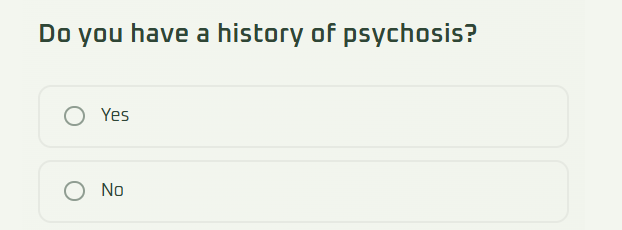
Our questions are carefully worded to get the information you need without making anyone uncomfortable. Instead of “Do you have any psychiatric disorders?” we might ask “Have you ever been diagnosed with or treated for any mental health conditions?” followed by supportive text explaining why we’re asking. It’s a small difference, but it matters.
The system flags potential concerns without making decisions for you. After all, you’re the clinician. We just make sure you have the information you need to make safe, informed decisions. And if someone does indicate a history that needs extra attention, the system can prompt additional assessment steps or specialist referral. It’s about supporting good clinical practice, not replacing it.
Pregnancy Screening for Patient Safety
Nobody wants to prescribe medicinal cannabis to someone who’s pregnant or breastfeeding. The TGA is crystal clear on this, and so are bodies like RANZCOG. But asking about pregnancy status needs to be handled sensitively, especially for patients who might be trying to conceive or have experienced pregnancy loss.
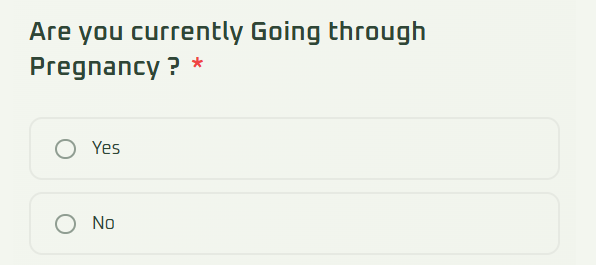
Our screening addresses this tactfully but thoroughly. We ask about current pregnancy status, breastfeeding, and even pregnancy planning. If someone indicates they might be pregnant, the system doesn’t just say “Sorry, no cannabis for you.” It provides helpful information about why we’re being cautious and what alternatives might be available.
This protects everyone involved. Patients get clear information about risks, you’re protected legally, and most importantly, we’re preventing potential harm. The documentation also shows you’ve done your due diligence, which your medical indemnity insurer will definitely appreciate.
Terms and Conditions Acknowledgment
Nobody loves reading terms and conditions, but they’re essential. The trick is making them digestible. We’ve taken all those requirements from AHPRA’s informed consent guidelines and broken them into chunks people will actually read.
Instead of a wall of legal text, patients see clear sections about driving (yes, you can get done for drug driving even with a prescription), workplace drug testing (your boss might not care about your prescription), travelling with medication (don’t try to take it to Bali), and storing Schedule 8 drugs safely (away from kids and visitors).
Each section requires active confirmation, so patients can’t just scroll and click. But we’ve written everything in plain English, so they’re actually understanding what they’re agreeing to. This isn’t just about legal protection; it’s about setting clear expectations from day one. When patients know the rules upfront, you get fewer confused phone calls and better treatment compliance.
Why These Questions Protect Your Clinic and Patients
Think of comprehensive screening as insurance you hope you’ll never need. But when a TGA auditor walks through your door, or a patient makes a complaint, or your insurer asks about your risk management processes, you’ll be very glad you have it.
We’ve seen clinics scramble to piece together documentation during audits. It’s stressful, expensive, and completely avoidable. With proper screening in place, you can hand over your records confidently, knowing everything’s there. Every age check, every contraindication assessment, every consent. All timestamped, all compliant, all sorted.
But here’s what really matters: good screening leads to better outcomes. When you catch contraindications early, identify patients who need extra support, and set clear expectations from the start, treatments work better. Patients trust you more because they can see you’re thorough and caring. And that trust translates into better adherence, fewer adverse events, and ultimately, healthier patients. That’s why we focus on the patient experience, not just compliance. Because they’re actually the same thing when done right.
Custom Screening Solutions for Your Practice
Every clinic is different. A specialised pain clinic in Perth has different needs from a cancer care centre in Melbourne or a GP in regional Queensland. That’s why we don’t do one-size-fits-all.
Our custom screening service starts with understanding your practice. What conditions do you treat most? What are your state’s specific requirements? What’s your patient demographic like? Do you need multiple languages? We take all of this and build screening forms that feel like they were made just for you because they were.
The beauty of customisation isn’t just about adding your logo (though we do that too). It’s about creating screening that matches your clinical workflows. If you always ask about sleep patterns for chronic pain patients, we’ll build that in. If you need specific questions for veterans under DVA schemes, no problem. Your screening becomes an extension of your clinical practice, not a generic hurdle patients have to jump. And yes, it’s still completely affordable. We’re not one of those companies that charge enterprise prices for basic customisation. [Request custom screening consultation]
Get Started with Cannabiz Elite Screening Today
Look, we get it. You’re busy running a clinic. The last thing you need is another complicated software implementation. That’s why we’ve made getting started ridiculously easy. Our standard forms cover 90% of what most clinics need, and they’re ready to go today. Need something special? We’ll sort that out too, without the usual software company drama.
Here’s our promise: affordable pricing that actually makes sense (no hidden fees or surprise charges), genuine focus on patient experience (because happy patients are compliant patients), and Australian-based support that actually understands medicinal cannabis regulations. We’re not some overseas company that’s never heard of the TGA or SAS-B.
What makes us different from other cannabis software companies?
We actually remember there’s a real person on the other side of that screen. While others pile on endless compliance checkboxes, we’ve designed our affordable screening tools around the patient journey. Because let’s face it, if your patients can’t complete the screening, compliance doesn’t matter anyway. So, join us now to be a Happy Customer of Cannabiz Elite.
